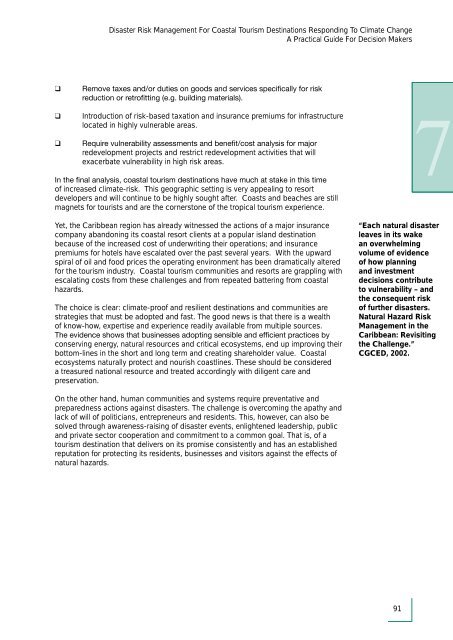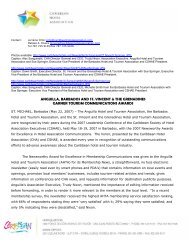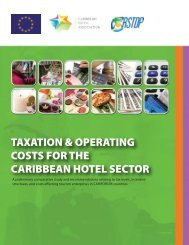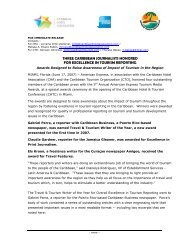Disaster Risk Management for Coastal Tourism - Caribbean Hotel ...
Disaster Risk Management for Coastal Tourism - Caribbean Hotel ...
Disaster Risk Management for Coastal Tourism - Caribbean Hotel ...
You also want an ePaper? Increase the reach of your titles
YUMPU automatically turns print PDFs into web optimized ePapers that Google loves.
<strong>Disaster</strong> <strong>Risk</strong> <strong>Management</strong> For <strong>Coastal</strong> <strong>Tourism</strong> Destinations Responding To Climate Change<br />
A Practical Guide For Decision Makers<br />
<br />
<br />
<br />
<br />
<br />
Introduction of risk-based taxation and insurance premiums <strong>for</strong> infrastructure<br />
located in highly vulnerable areas.<br />
<br />
redevelopment projects and restrict redevelopment activities that will<br />
exacerbate vulnerability in high risk areas.<br />
<br />
of increased climate-risk. This geographic setting is very appealing to resort<br />
developers and will continue to be highly sought after. Coasts and beaches are still<br />
magnets <strong>for</strong> tourists and are the cornerstone of the tropical tourism experience.<br />
Yet, the <strong>Caribbean</strong> region has already witnessed the actions of a major insurance<br />
company abandoning its coastal resort clients at a popular island destination<br />
because of the increased cost of underwriting their operations; and insurance<br />
premiums <strong>for</strong> hotels have escalated over the past several years. With the upward<br />
spiral of oil and food prices the operating environment has been dramatically altered<br />
<strong>for</strong> the tourism industry. <strong>Coastal</strong> tourism communities and resorts are grappling with<br />
escalating costs from these challenges and from repeated battering from coastal<br />
hazards.<br />
The choice is clear: climate-proof and resilient destinations and communities are<br />
strategies that must be adopted and fast. The good news is that there is a wealth<br />
of know-how, expertise and experience readily available from multiple sources.<br />
<br />
conserving energy, natural resources and critical ecosystems, end up improving their<br />
bottom-lines in the short and long term and creating shareholder value. <strong>Coastal</strong><br />
ecosystems naturally protect and nourish coastlines. These should be considered<br />
a treasured national resource and treated accordingly with diligent care and<br />
preservation.<br />
7<br />
“Each natural disaster<br />
leaves in its wake<br />
an overwhelming<br />
volume of evidence<br />
of how planning<br />
and investment<br />
decisions contribute<br />
to vulnerability – and<br />
the consequent risk<br />
of further disasters.<br />
Natural Hazard <strong>Risk</strong><br />
<strong>Management</strong> in the<br />
<strong>Caribbean</strong>: Revisiting<br />
the Challenge.”<br />
CGCED, 2002.<br />
On the other hand, human communities and systems require preventative and<br />
preparedness actions against disasters. The challenge is overcoming the apathy and<br />
lack of will of politicians, entrepreneurs and residents. This, however, can also be<br />
solved through awareness-raising of disaster events, enlightened leadership, public<br />
and private sector cooperation and commitment to a common goal. That is, of a<br />
tourism destination that delivers on its promise consistently and has an established<br />
reputation <strong>for</strong> protecting its residents, businesses and visitors against the effects of<br />
natural hazards.<br />
91








